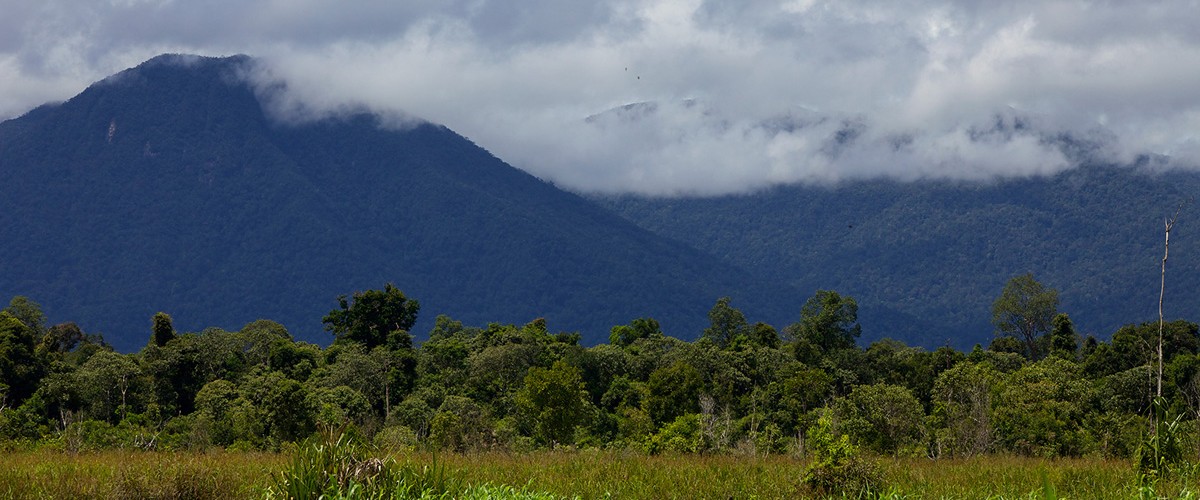By Simon Tampubolon, GPOCP Environmental Education Field Coordinator
Held annually at Cabang Panti Research Station since 2014, One Forest Project, in collaboration with Gunung Palung National Park (GPNP), have just led a fantastic and much beloved field course where they taught applied research design and analysis, field techniques, ecology, and botany. The course is intended for local and regional capacity building and included participants from ASRI, IAR, Titian, Planet Indonesia, Orangutan Foundation, staff from Gunung Palung National Park, as well as representatives from five other protected areas in Borneo and throughout Indonesia. GPOCP was also honored with an invite, where we sent Simon Tampubolon, our Kayong Utara Environmental Education Coordinator, and Erik Sulidra, our Database & Animal Protection Coordinator.
 |
|
The 2019 field course group at Cabang Panti Research Station.
|
The course presenters (and organizers) were Professor Andrew Marshall (One Forest Project) from the University of Michigan teaching in biological anthropology, tropical ecology and conservation biology, Mr. Endro Setiawan from GPNP and head of Cabang Panti Research Station, teaching para-taxonomy and botany, and Mr. Kiki Prio Utomo, from Tanjungpura University, who teaches in environmental engineering specializing in hydrology and limnology conservation.
 |
|
Lectures from hydrology expert Mr. Kiki Prio Utomo about the water, by the water.
|
The course kicked off at the GPNP office in Ketapang with two lectures; an Introduction of Tropical Rain Forests by Dr. Marshall and Capturing Biodiversity through Photography by Endro Setiawan. The following day we set off towards the Cabang Panti Research Station in the heart of GPNP. After a 2-hour car journey from Ketapang to the small village of Tanjung Gunung, we started our 5 hour hike – making pretty good time for such a large group! What greeted us first was the amazing suspension bridge above crystal clear water – somewhat like a Tarzan bridge that preludes to the adventures that surround this rainforest research station.
 |
| Applied plant ecology and identification lectures by Mr. Endro Setiawan, from Gunung Palung National Park. |
The field lectures included plant ecology and vertebrate tropical rainforest ecology, an introduction to vertebrate surveying, camera trapping, tracking animals and footprints, evolution and taxonomy of plants, plant characteristics, plant photography, introduction to scientific research, orangutans, sampling design and statistical basis, hydrology and water conservation.
The most challenging aspect to learn was the botany. We were introduced to 15 plant families and learned their general characteristics. We were taught to identify plants by looking at the types of leaves, the location of leaves, stipule, sap, and smell. At the end of that module, a plant identification quiz was held. The staff prepared a variety of plant samples by taking stalks and leaves and placing them on a table. Each participant was given time to determine the family of each plant. Most of the participants were able to identify 10 of the 15 plants, with the highest score being 13.
 |
|
Tropical rainforest ecology field lecture by Dr. Marshall from One Forest Project & University of Michigan.
|
The next module that was very new for us was on the topic of hydrology delivered by Mr. Kiki Prio Utomo from Tanjungpura University Faculty of Engineering. The biggest take away from that course material was that forests greatly affect rainfall in and around all forest areas. Based on the results of a 2015 study, when large fires occurred throughout Kalimantan, rainfall recorded at Cabang Panti Research Station was very high in contrast to other regions, thus preventing catastrophic damage to our area.
Learning about tropical rainforests whilst literally in the midst of one of the last wildlife strongholds in Borneo was beyond inspiring and provided a relaxing atmosphere to learn and and build great camaraderie with the other participants. The main focus of the field course was about scientific research. We were taught research design from formulating a research question, making a hypothesis, and collecting and analyzing field data. During the last few days, we were given an assignment and broken into 4 groups with different research topics in order to apply our newly gained skills and knowledge. First, each group discussed research topics and presented research proposals to the lecturers. One project was about moths, one about epiphytes, another on butterflies, and one about hydrology. The following two days we put our field techniques to the test by collecting samples and analyzing the data obtained. Next, we presented the results of our mini research projects. The projects demonstrated the complexity of fulfilling a project from theory to data collection to a final presentation. And though we had to consult Dr. Marshall on numerous occasions, we all learned so much about applied research design, including field techniques, teamwork, and adaptability.
 |
|
Tree identification training using leaves and tree structure.
|
To our surprise and delight, we got to see some of the more unorthodox inhabitants of Cabang Panti as well, such as Edi, the wild boar. Edi lives in the forests around the research station and we saw him moving around the edges of camp, and sometimes even under the main building at night to shelter from the rain! Another friendly inhabitant was the monitor lizard, named Hugo, who came by at night. We were also joined by bigger-than-excepted fish and even some turtles when we swam in the river!
 |
|
Group presentations on mini research projects. Photos © Simon Tampubolon
|
In our spare time (usually at night) we were never without things to do. We learned from some of the field assistants how to weave bracelets from raw materials and to carve canarium fruit seeds into necklace charms. We played jenga, chess, and table tennis, as well as sang and played the guitar when we weren’t helping the kitchen staff prepare food. We forgot about our gadgets and stress from the cities, and enjoyed being present in the simple beautiful life of the forest and each other’s company.
After our time in the forest, and our spirited hike back down the mountain – we had to say good bye to our new found friends and colleagues. It was bittersweet and nostalgic, as the field course had felt a little like summer camp with lots of laughs, learning and fun! We can’t wait for next year, and we are very thankful to One Forest Project and Gunung Palung National Park for hosting this great field course!






